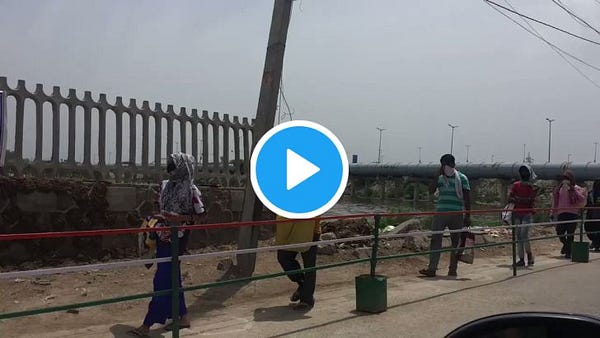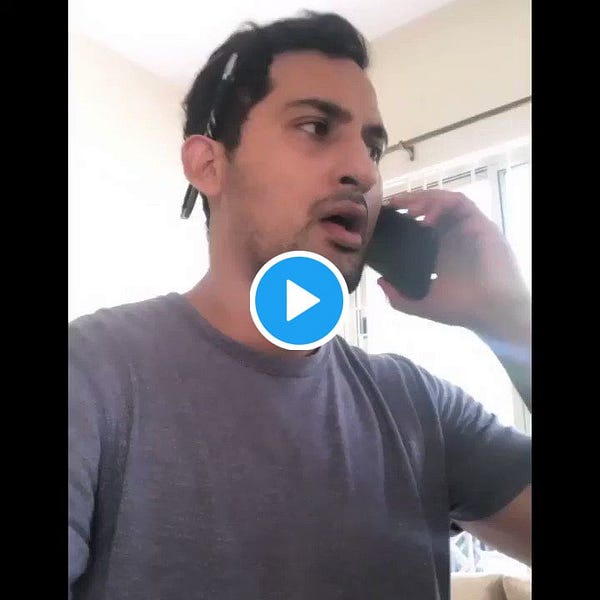The Political Fix part 2: Does India have the money and means to deliver a Basic Income to poor citizens?
A weekly newsletter on Indian policy and politics from Scroll.in.
Welcome to the Political Fix by Rohan Venkataramakrishnan, a weekly newsletter on Indian politics and policy. To get it in your inbox every Monday, sign up here.
If you want journalism with spine not spin, consider supporting us either by subscribing to Scroll+ or contributing to the Scroll.in Reporting Fund.

Recommendation Corner
Manisha Pande is an executive editor at Newslaundry, where she hosts and scripts a Daily Show-style news critique show, TV Newsance.
Here are her recommendations:
“On this week’s episode of TV Newsance, we shows how a large section of TV news channels is continuing to communalise the pandemic. On April 14, scores of migrants had gathered outside Bandra depot to put forward their demand to go back home. A mosque happened to be around this gathering, which, then, became the centrepiece of primetime shows –
‘Why is it that crowds gather only outside a mosque during the lockdown’” asked one anchor.A detailed ground report on Newslaundry responded to questions that TV news anchors raised but didn’t bother looking into.
There’s also this New Yorker piece by Michael Luo on how the pandemic may affect the media and debates around the paywall.
And while TV news anchors and policemen dress up as corona, here’s a Vox look at what the virus may actually look like.”
Have recommendations for an article, book, podcast or academic paper that deals with Indian politics or policy? Send it to rohan@scroll.in. Previous recommendations from the Political Fix are collected here.
Ground Report
Supriya Sharma and Vijayta Lalwani have been out reporting to provide you a look at what the Covid-19 means for the millions in India who rely on daily wages. The picture is not a comfortable one.


Read these tworeports and another piece about the video above.
“Near the shelters, another group of workers had echoed the same sentiment. They had heard Modi’s speech on a smartphone that morning. ‘Modi ji must give us two or three days to go home,’ said Ajay Mishra, a migrant worker from Hardoi district in Uttar Pradesh. ‘Bimari ho to bharti kara dein, bimari nahi hai to bhej dein.’ Those who have the disease should be admitted to hospitals, those who don’t should be sent home.
Half a kilometre away, Shiv Kumar Kashyap, a worker from Bilaspur district of Chhattisgarh, said it was understandable the government did not want migrants to go home to prevent the spread of the coronavirus disease. ‘But they should make some arrangements here,’ he said. ‘Where will we get soap and clothes from? There is no work, no money. Kehte hai safai karo, haath dho baar baar, kahan se dhoyenge.’ They say wash your hands again and again, but how do we do this?”
Read all of our coronavirus coverage here.
And if you need a break from all the hard news, there’s Art of Solitude, our series on the creativity that is helping people tide over these times.
If you enjoy this newsletter and our journalism, I have a request: To ensure we can continue to bring you all the reportage, analysis and other coverage that is vital in these times, we need your help!
You can support Scroll.in by contributing to our reporting fund or, if you are abroad, subscribing to Scroll+.
Linking Out
Using the language of compassion, rather than that of justice, is a cop-out for the state. Pratap Bhanu Mehta argues in the Indian Express that the “compassion as an expression of solidarity presupposes power, because it appeals to someone’s discretion, not to their obligation.”
Similarly, the war metaphors make it easier for the state to avoid accountability. Suyash Rai and Rahul Verma write in the Hindustan Times about why India should not compare the fight against Coronavirus to a military engagement.
Why is India opposed to a fresh issue of Special Drawing Rights from the IMF? Jayati Ghosh, in the Wire, argues that India’s opposition is geopolitical rather than economic, and neither potential reasons are good ones.
However Covid-19 plays out, India faces a humanitarian crisis. Mathieu Ferry & Govindan Venkatasubramanian & Isabelle Guérin & Marine Al Dahdah write about how the lockdown presents as many challenges to the Indian state as the virus.
The RBI has tried yet again to add liquidity to Indian markets. It won’t work, writes TK Arun in the Economic Times. The bank will have to roll up its sleeves and actually wade in.
Authorities need to understand how the economy is interlinked. Any attempt to make a way out of the lockdown will have to be based on a proper understanding of the networked nature of modern industries, writes Niranjana Rajadhyaksha in Mint.
The Hindustan Times refused to publish a piece questioning the government’s plans for a new Central Vista in Delhi. Read Ram Guha’s piece in the Wire instead.
The Society for Social and Economic Research asked a series of researchers to obtain information on what is happening during the Covid-19 lockdown in their study villages.The reports are here.
Can’t make this up
Do you know ludo, also called Parcheesi in the US? It is one of India’s most popular games, with a digital variant usually sitting at the top of gaming app lists on Android.
And it also apparently can get people in trouble and shot-at. File under ‘things that happen in UP’:
Amid fears over the spread of coronavirus, a 25-year-old man was allegedly shot at by another person, following an argument that was triggered by his “coughing” during a game of ludo at Greater Noida, police said on Wednesday.
Meanwhile, comedian Danish Sait has been putting out the most spot-on accents of people from Bengaluru in a series of videos about what it’s like to live through the lockdown that you have to watch.
If you found the Political Fix useful, please do share and subscribe. And if we missed any useful links or tweets, write to rohan@scroll.in



